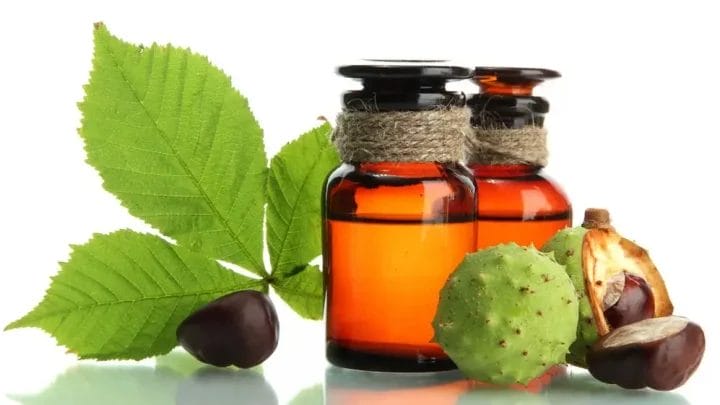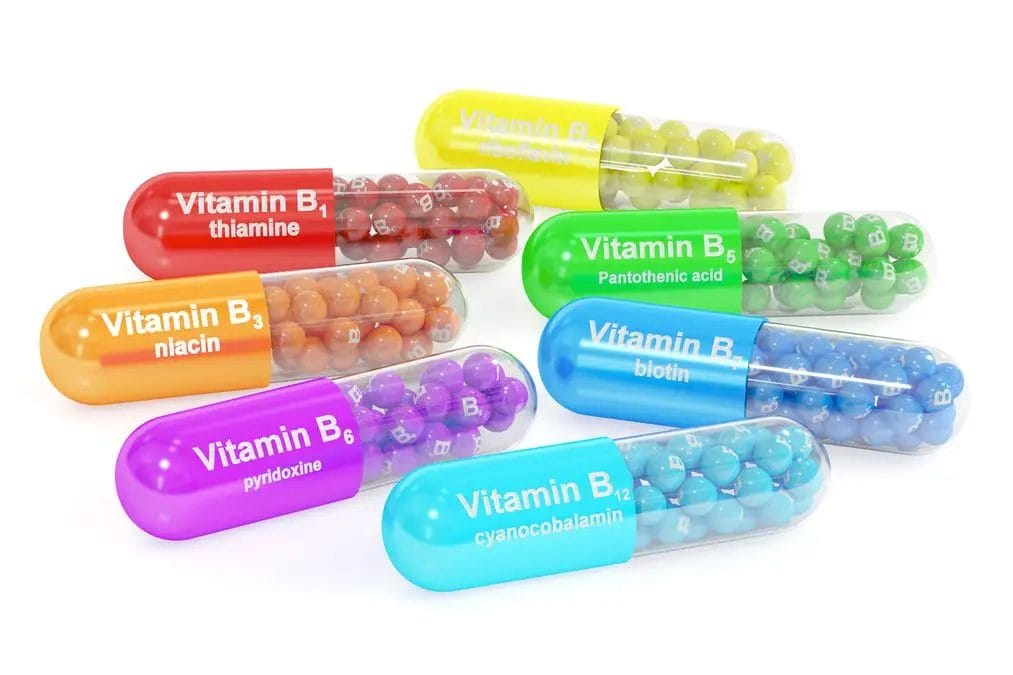
Vitamin B – types, effects and health properties
In order to function properly, the human body needs a number of nutrients, which are found primarily in food, so it is important to take care of a properly composed diet. These substances have various functions, providing energy, regulating important bodily processes, and participating in the formation of tissues of which our body is composed. We need nearly 60 of them, and the most important, included in the so-called exogenous compounds, which must be supplied from the outside, are some amino acids, unsaturated fatty acids, micro- and macroelements and vitamins. One of the most important, without which we practically cannot do without, is vitamin B, which occurs in numerous, but always necessary varieties.
Contents
Vitamins – definition and basic division
However, before we get into a more detailed description of B vitamins, we should know what vitamins actually are and what importance they have for our health. The common definition says that vitamins are small organic compounds of varying structure, occurring naturally or obtained synthetically. We can safely say that they are essential, responsible for the course of numerous metabolic processes, regulating the work of the entire human body, which unfortunately is not able to produce them on its own.
Research on vitamins and their significance for health was initiated in 1913 by a Polish biochemist Kazimierz Funk, who also created their name being a combination of two Latin words, vitae, meaning life, and amina, a word derived from an amino group. We divide vitamins primarily by their solubility, obtaining two basic groups:
- water-soluble, which include the B vitamins and vitamin C, or ascorbic acid, a powerful antioxidant that removes free radicals and also participates in the synthesis of collagen;
- fat-soluble vitamins, and this group includes, among others, vitamin A, responsible for the vision process, vitamin D, taking care of growth and mineralization of teeth and bones, vitamin E, preventing heart disease and cardiovascular diseases, regulating muscle metabolism, vitamin K, conditioning proper blood clotting.
Vitamins – the effects of their deficiency
Since the human body does not produce vitamins, it is absolutely necessary to remember about their appropriate amounts in the daily diet. If we do not take care of it, we are threatened with avitaminosis, a serious disease caused by deficiency or complete lack of vitamins. Its symptoms depend on what we are currently lacking, and the division of negative effects caused by a deficiency of any vitamin group is as follows:
- Vitamin A deficiency means problems with vision, deterioration of the skin, including the development of acne , dry, brittle and falling out hair;
- deficiency of B group vitamins results in problems of the digestive system, lack of appetite, accelerated balding, dry skin, nervousness and irritability, difficulty in sleeping leading even to insomnia, trembling hands, osteoporosis, problems with concentration and memory, a feeling of chronic fatigue, cardiovascular diseases
- vitamin C deficiency is drying and flabbiness of the skin resulting from weakening of collagen fibers, swelling of the lower limbs, a decrease in physical performance, immunity weakness
- Vitamin D deficiency, manifested by weakness of muscles and skeletal system, mood drops, conjunctivitis, dermatitis, lower immunity, rickets in children;
- Vitamin E deficiency leads to weakened immunity, accelerates the natural aging process of the body, lowers male libido, impairs motor coordination, causes irritability and a noticeable decrease in concentration;
- Vitamin K deficiency can become the cause of blood clotting disorders, increased risk of cancer, poorer wound healing, lower bone mineralization, calcification of blood vessels, damage to internal organs, especially the liver.
B vitamins – varieties and health benefits
We already know how important it is to get the right doses of vitamins every day, either with food or in the form of dietary supplements that have them in their composition, comprehensively taking care of various aspects of our health. The effects of deficiency, as seen in the examples above, definitely should not be underestimated, unless we want to expose ourselves to even more serious complications.
So let’s take care of an appropriate level of B vitamins, which, like the others, are not stored in the body, but have a beneficial effect on it, ensuring long preservation of full health. Science has identified as many as 12 varieties of vitamin B, and among them we need the most are:
Vitamin B1 (thiamine)
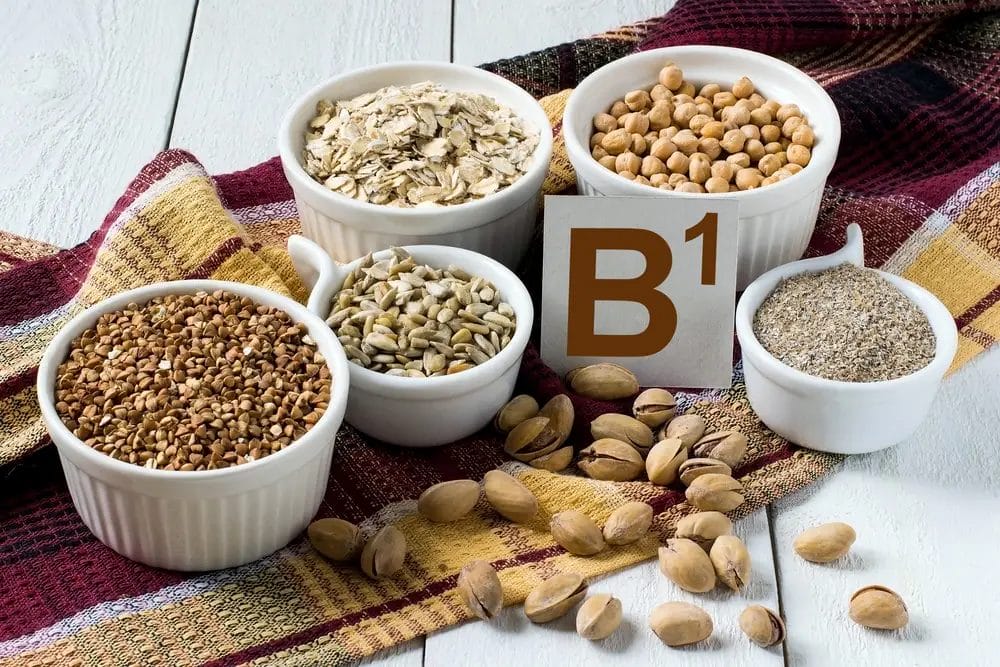
First detected by Kazimierz Funk, and the daily requirement of vitamin B1 indicated by doctors should be 1.2 to 1.5 mg for men and 1 to 1 .1 mg for women. The basic source of thiamine is a properly composed diet, and it can be found in milk, yoghurt, cottage cheese, bran, buckwheat groats, liver, legumes, Brussels sprouts, asparagus, currants, bananas. The action of vitamin B1 comes down primarily to:
- stabilization of the brain and nervous system, resulting in improved concentration and increased cognitive abilities, we are also able to absorb new information faster;
- supporting the cardiovascular system, preventing, among other things, accelerated heart rate and its dangerous enlargement;
- strengthening the immune system, a natural barrier preventing infections and diseases that may affect the whole body;
- counteracts muscle pain, removes the feeling of continuous fatigue, accelerates regeneration after exercise;
- Participates in the metabolism of amino acids and carbohydrates, thanks to which we are able to burn them more efficiently and we are not at risk of rapid weight gain;
- regulates insulin secretion by the pancreas, so it is an important part of diabetes prevention.
Vitamin B2 (riboflavin)

Vitamin B2 is another vitamin our body needs, and its daily requirement is 1.6 – 2.2 mg for women and 2.4 – 2.8 mg for men. It is an organic compound composed of two components: ribitol and flavine, and large amounts of it are contained in potatoes, dry pulses, cereals, dairy products, eggs, green vegetables, strawberries, and walnuts.
The principal function performed by vitamin B1 is the guarantee of correct vision, and the absence of the risk of cataract. Other, equally important, functions are:
- strengthening immunity;
- protection of the mucous membranes lining the digestive system from damage;
- Participation in metabolic processes aimed at a more effective burning of fat tissue, which is why it can be found in dietary supplements supporting weight loss, such as Hai Matcha, based on green tea;
- enhances the action of insulin;
- participating in the processes of red blood cell production;
- regulation of the body’s hormonal balance, including the secretion of anti-inflammatory cortisol;
- lowering too high blood pressure, stabilization of heart function;
- protection against negative effects of oxidative stress;
- ensuring proper functioning of the nervous system due to its influence on the production of neurotransmitters, dopamine and serotonin.
Vitamin B3 (niacin)
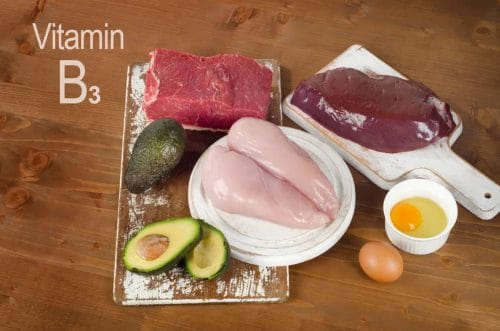
Also called vitamin PP, it can be safely considered the most important for the proper functioning of the brain and nervous system, and the daily requirement for an adult is as much as 14 – 17 mg. Although the human body produces it in small quantities, it is necessary to supplement its possible deficiencies by eating cheese, chicken eggs, mixed and wholemeal bread, pasta, semolina, rice, poultry meat, onions, carrots and fruit. This will have a positive effect on:
- hair, which will become stronger, less brittle and stop falling out, and large amounts of vitamin B3 are contained in the recommended supplement against this phenomenon, Hair Care Panda;
- Optimisation of the secretion of hormones, cortisol and insulin;
- increased muscle performance;
- lowering toxin levels;
- normalizing blood pressure, alleviating symptoms of heart disease;
- lowering the level of “bad” cholesterol in the blood;
- improve overall health by affecting multiple systems and organs, which can be helped by another tablet containing it, HEY!GUMMY, which also contains ginger.
Vitamin B5 (pantothenic acid)
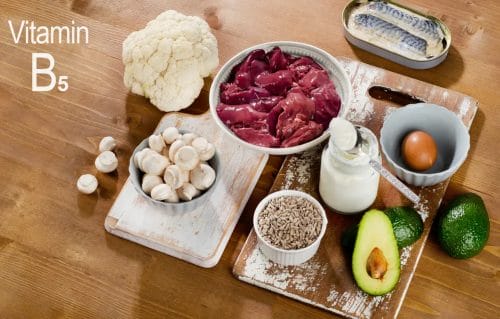
The most beneficial for the health of skin, nails and hair, including eyelashes, that’s why it’s an ingredient in Revamin Lash conditioner, which makes eyelashes thick, long and seductive. It is most abundant in fish, poultry, eggs, oranges, melons, whole grain bread, legumes and soybeans. Vitamin B5 is actually a mixture composed of pantothenic acid, pantheine, panthenol and coenzyme A, responsible for:
- steroid hormone synthesis processes, including cortisol, testosterone and progesterone;
- production of neurotransmitters, dopamine and serotonin;
- production of antibodies that form the immune system;
- cholesterol synthesis;
- accelerating skin regeneration and stopping natural aging;
- counteracting greying and strengthening the weakened hair structure;
- functioning of the nervous system, correct functioning of cognitive functions;
- prevention of the digestive system ailments, abdominal pain or nausea;
- alleviation of premenstrual syndrome.
Vitamin B6 (pyridoxine)
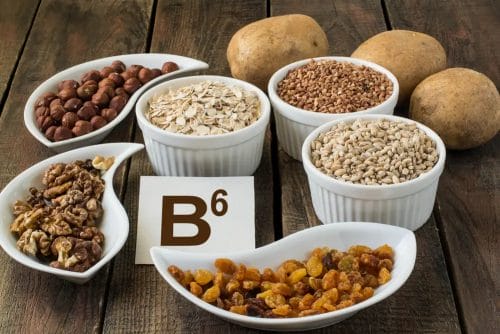
Vitamin B6 is essential for the nervous system and the brain, so it should be supplied in the dose of 1 – 2 mg a day, and deficiencies will be supplemented by Brain Actives, a supplement with effects similar to those of nootropics. It can also be found in whole grain cereals, sea fish, liver, eggs, dairy products, raspberries, currants, oranges, beans, broccoli, carrots and artichokes. By providing adequate doses of vitamin B6, we can count on:
- faster synthesis of nucleic acids, proteins and hormones necessary for the functioning of the nervous system, adrenaline and serotonin;
- higher production of haemoglobin, which carries oxygen from the lungs to all body tissues, also ensuring better oxygenation of the brain;
- more efficient combustion of carbohydrates and fats, which contributes to weight reduction, getting rid of excess body weight and obesity;
- strengthening the immune system through the increased production of antibodies;
- a more effective fight against acne and other skin diseases, such as excessive hair loss;
- no more painful muscle cramps;
- lower risk of insomnia.
Vitamin B7 (biotin)
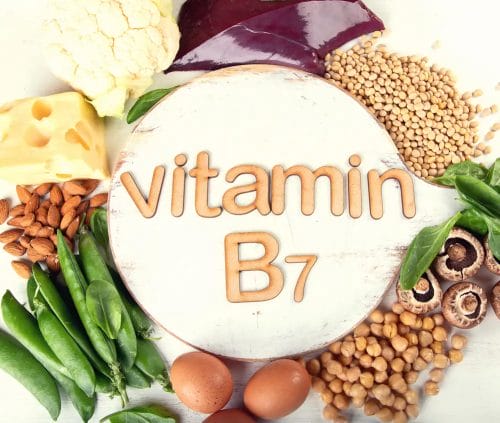
Known primarily for its positive effects on hair and nails, its natural sources include milk, egg yolks, mushrooms, soybeans, brewer’s yeast, brown rice, whole grain products, spinach and liver. The recommended daily dose of vitamin B7 for adults is 1 – 2 mg, it is very difficult to overdose, but if you exceed the allowed doses, you can expect abdominal pain, vomiting and nausea. Specialists consider the action of biotin to be comprehensive and, in summary, it boils down to:
- strengthening hair, improving its structure by increasing the production of keratin and preventing hair loss, in which Jelly Bear Hair jellies containing large amounts of vitamin B7 significantly help;
- maintaining good skin condition, preventing excessive sebum secretion, preventing seborrheic dermatitis and the occurrence of discoloration or acne ;
- minimize the risk of malformations in children, so pregnant women should take care of its proper level;
- better absorption of vitamin C;
- active participation in metabolic processes, breakdown of fatty acids, thus helping in weight loss; it is therefore included in the composition of Slimdropico drops.
Vitamin B9 (folic acid)

Also known as vitamin B11 or folacin, it is necessary especially for pregnant women, and its deficiency leads very quickly to anemia and serious defects in the development of the fetus, especially its nervous system. Its sources are green leafy vegetables, pulses, offal, ripened cheese, and the recommended daily dose is 400 µg for men and 600 µ g for pregnant women. Other noteworthy effects of folic acid are:
- normalization of the nervous system, relieving the effects of stress, preferably with Restilen tablets, and one of the components of the unique Saffr’Activ® formula contained in them is precisely vitamin B9;
- overseeing the processes of correct cell growth;
- supplying energy necessary not only for physical activity, but also for performing many everyday activities;
- faster regeneration of skin damage caused by sunlight, preventing sagging skin, wrinkles and stretch marks, and this action was appreciated among others by the manufacturer of Revamin Stretch Mark cream.
Vitamin B12 (cobalamin)
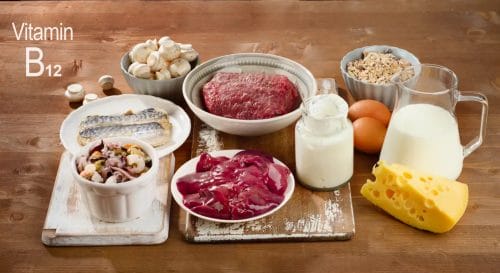
Its proper dosage should also be taken care of, providing it in a daily dose of 4 µg, introducing into the diet seafood, nutritional yeast, liver, wheat germ, milk, cheese, eggs. Interestingly, cobalamin cannot be found in plant products, so vegans should definitely remember about its supplementation. Otherwise, they have to reckon with serious health consequences:
- symptoms of megaloblastic anemia, a form of anemia, shortness of breath, pale skin and dizziness;
- malfunction of the nervous system, disturbances of concentration, smell, movement and sensation;
- impaired vision, since lack of cobalamin causes progressive degeneration and atrophy of the optic nerve
- gastrointestinal problems, from loss of appetite to nausea, diarrhoea, constipation and tastelessness
- skin symptoms, albinism and yellowing of the skin;
- mental health problems due to neurotransmitter disruptions, severe stress, depression, irritability and mood swings;
- decreased libido; Expansil Cream, full of aloe vera extract and the vitamin B12 contained in it, will help to restore sexual efficiency;
- age-related macular degeneration;
- increased risk of osteoporosis.
Sources:
- https://www.healthline.com/nutrition/thiamine-deficiency-symptoms
- https://www.healthline.com/health/vitamin-watch-what-does-b2-do
- https://www.healthline.com/nutrition/niacin-benefits
- https://www.healthline.com/health/vitamin-watch-what-does-b5-do
- https://www.healthline.com/nutrition/vitamin-b6-benefits
- https://www.healthline.com/health/the-benefits-of-biotin
- https://www.healthline.com/nutrition/folic-acid
- https://www.healthline.com/nutrition/vitamin-b12-benefits



